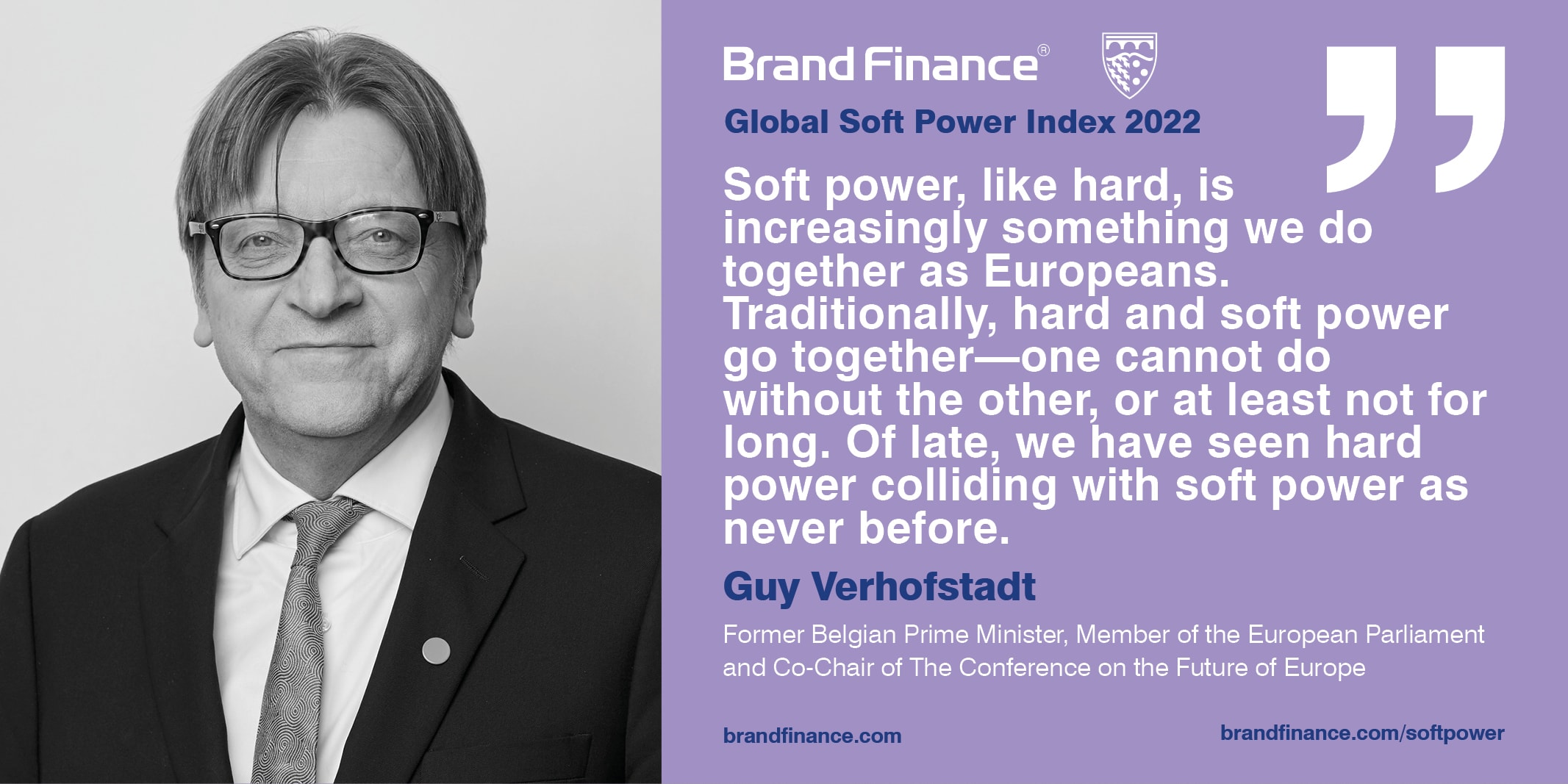This article was originally published in the Global Soft Power Index 2022.

Soft power, like hard, is increasingly something we do together as Europeans. Traditionally, hard and soft power go together—one cannot do without the other, or at least not for long. Of late, we have seen hard power colliding with soft power as never before. The conflict that overshadows everything at this moment started with an EU-Ukraine Association Agreement and ended in a Russian threat of unprecedented war.
The Ukrainian people wanted to be close to Europe, to be a part of Europe, to be European in every sense of the word… but the geopolitical agenda of Putin dictated otherwise—at least for now. And overnight, the traditionally soft EU has extended itself into a geopolitical, partially military hard power. The interplay between soft and hard power is as relevant as ever.

The EU’s X-Factor
Even Europe’s soft power, however, remains undiagnosed and underused. In the 2021 Global Soft Power Index there was only one mention of the European Union… in the context of geographical indication protection for Parmigiano Reggiano. Yet EU influence is considerable in all seven of Brand Finance’s pillars of soft power: business and trade, governance, international relations, culture and heritage, media and communication, education and science, people and values.
To start with the last: the best compliment is emulation. While the European Union has been in undeniable political crisis since 2008, and while its liberal-democratic ethos and institutions have been undermined especially since 2016, they remain a model and an aspiration for people who don’t enjoy them across the world. The values of individual independence, economic, social, intellectual, cultural and sexual freedom, democratic sovereignty and cross-border cooperation all remain attractive. If big global players like sovereignist states or multinational companies don’t always like to listen to the EU, their citizens and customers are all ear for what Europe stands for.
In contrast, the soft power of the hard powers remains limited. China really re-emerged on the global stage with the 2008 Olympics, the day Putin attacked Georgia. The 2022 Winter Olympics proved an understated success for China, with painful silences around human rights abuses all too present, whereas Russia was notably and degradingly absent for never playing by the rules. While their economic and geopolitical presence has continued to expand and their propaganda power is huge, their truly ‘soft’ attraction remains far less impressive. And that was before Putin’s mask came off for good.
Strengthening Soft Power
Both soft and hard power increasingly take place in a European context. Europe is the perspective through which Europe’s nations see the wider world and their own role in it. European integration is the process to update both. Now that such an update is more than ever needed, the EU needs to make better use of its soft power across the board, strengthening and extending national efforts.
Trade and competition policies are one way to do it: regulating open trade to include new sensitivities such as sustainability, human rights and health issues, and updating competition rules so that we create European competitors and tackle overbearing mastodont companies refusing to play by our rules on privacy or hate speech, tax or sustainability concerns.
Europe’s market power and educational strength can also go further in science and innovation, both in traditional strengths like pharmaceuticals and in digital sectors where our lack of integration has cost us dearly.
The EU's monetary success has been understandably overshadowed by the euro crisis, but it remains a key asset and should be made more of. It is a tangible symbol of our cross-border interconnectedness, but should also be boosted in its uses as a global reserve currency. And why not use culture, so important for Europe’s appeal and self-image, to really boost its attraction world-wide, focusing more on what binds us as Europeans than what divides us along national cleavages?
Hard Power Foundations
The real trouble is the limited hard power of the soft powers. Weakness is never a good basis: EU and its members fall short in elementary aspects of sovereignty, like defence, cyber and migration management. It is not enough at the avant garde of creating or keeping digital companies, setting digital or sustainability standards. Its diplomatic clout is waning, even a traditional strength like development is less sure than before. Who developed the vaccines… and who did vaccine diplomacy best? Fragmentation and self-doubt are undermining both our hard and soft power.
If the current turmoil makes us see sense on our geopolitical weaknesses, it should also spur us to reconnect hard and soft power. We have to reinforce our governance model to underline our democratic and rule of law credentials. We have to double down on the fight against the corruption and cybercrime tendencies that weaken our societies. We have to be bolder in defending the rights, freedoms and values that form the basis of our international attraction. And we have to finally make a positive story out of immigration.
Promotion starts with self-belief and shared strategies. This is the time to think ahead.

